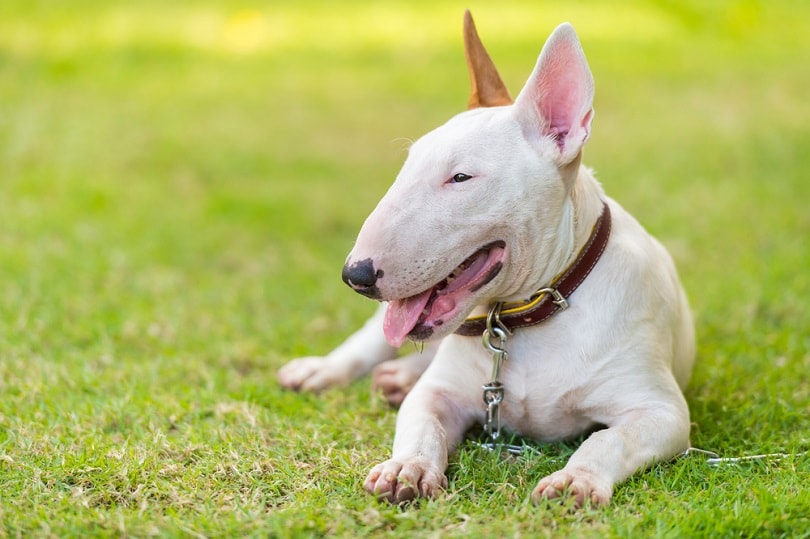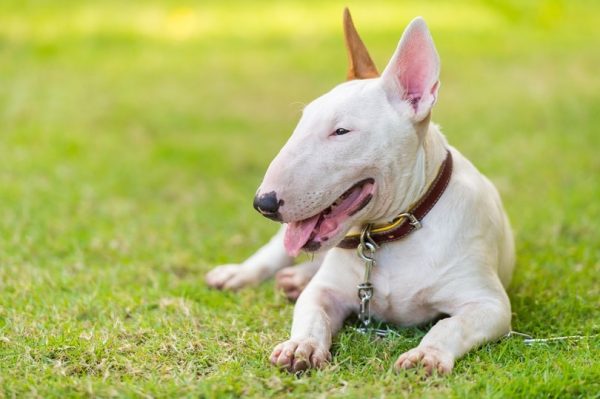Click to Skip Ahead
For people with allergies, owning a dog can be a challenge, but certain breeds have been identified as producing less of a reaction than others. A common misconception is that people who are allergic to pets are allergic to the fur, but it is actually the proteins contained in saliva, urine, feces and dander (dead skin cells) on the dog’s coat and environment that cause the watery eyes, sneezing, itchy throat, rashes and coughing in allergy sufferers. You might think that short-coated dogs would carry the least amount of these allergens, but this is not necessarily the case.
Bull Terriers are a unique breed of dog that are popular for their distinctive appearance and playful personalities, but are they hypoallergenic?
Unfortunately, Bull Terriers are not hypoallergenic. While no dog breed is truly hypoallergenic, some dog breeds are considered more hypoallergenic than others, but Bull Terriers do have allergy-triggering characteristics for those individuals who are sensitive to dog allergens.
Still curious? Read on as we discuss everything about the non-hypoallergenic Bull Terrier!

What Does “Hypoallergenic” Mean for Dogs?
Hypoallergenic is a term used to describe dogs that produce fewer allergens than other breeds, making them less likely to trigger allergic reactions in sensitive individuals.
It is important to note that there is no such thing as a completely hypoallergenic dog breed. All dogs produce some level of allergens, but some breeds are less likely to cause allergic reactions than others — therefore being classified as “hypoallergenic”.
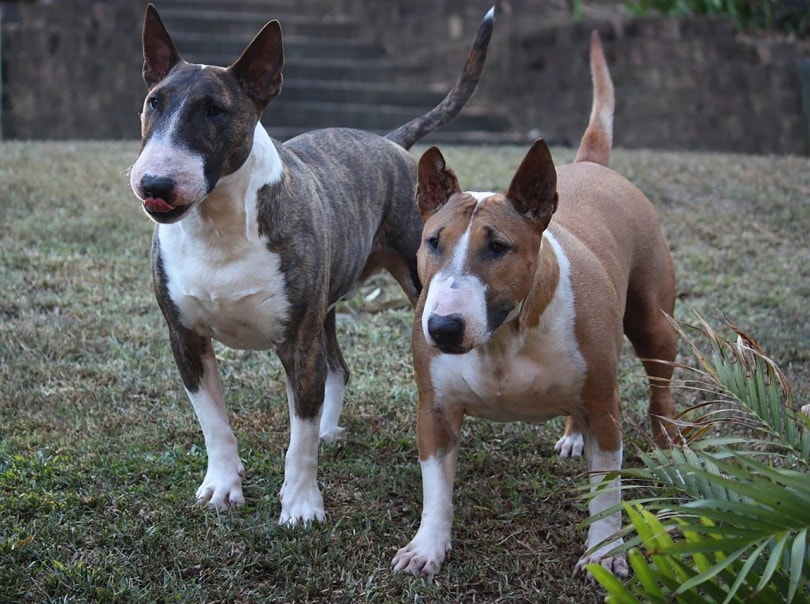
What Makes Bull Terriers Non-Hypoallergenic Dogs?
Bull Terriers are not considered a hypoallergenic breed. Many people would assume that Bull Terriers are hypoallergenic because of their short coat, but it is important to note that there are several reasons why they can still trigger allergic reactions in sensitive individuals.
The actual allergen that causes allergies in humans is a protein found in the dander, saliva, and other things produced by dogs. With this in mind, let’s look at why Bull Terriers are not hypoallergenic and how those protein allergens can spread.
1. Dander
Like all dogs, Bull Terriers produce dander, which is a common allergen due to its protein content. Dander is made up of tiny, skin-like flakes that can become airborne and trigger allergic reactions in sensitive individuals.
2. Shedding
Despite their short coat of fur, Bull Terriers shed their coats regularly. This frequent shedding can release dander into the air which can trigger allergic reactions.
Their short, dense coats can also be difficult to clean from soft furnishings, which can also exacerbate allergies.

3. Saliva
Another common allergen that most people overlook is saliva. Bull Terriers’ saliva can also contain the protein allergens that can cause reactions in some people.
When they lick their fur or their owners, they can spread these allergens to other areas, especially around the house.
4. Urine and Fecal Matter
Like all dogs, Bull Terriers have to go potty. Allergens can also be found in urine and fecal matter which can easily trigger allergies if they are not properly potty trained and go potty inside the house.
5. Musky Odor
Dogs have distinct smells, hence the term “it smells like dog in here” and Bull Terriers are no exception. Some Bull Terriers can have a strong, musky odor that can be unpleasant and exacerbate allergies in some people.
I Already Have a Bull Terrier, What Can I Do to Reduce Allergies?
If you already have a Bull Terrier and suffer from allergies, there are a few steps you can take to reduce allergy triggers; proper hygiene, grooming, and maintaining a clean environment are crucial.
First, you can groom your Bull Terrier regularly to reduce the amount of dander they produce. Brushing your dog daily, bathing them regularly, and keeping their bedding clean can help to minimize the amount of dander in your home. Proper maintenance and brushing of their coat can also reduce their shedding around the house. Be careful not to use shampoos too frequently as this can lead to drying out of the skin and increasing dander load. Instead, bathe with plain water or a doggy-safe conditioner that will lift loose dander without triggering the excessive production of more.
Keeping your dog’s skin and coat healthy can reduce the risk of allergic reactions. Properly inspect your dog’s skin as skin irritations can cause more dander and shedding, which can be difficult for sensitive individuals. There are dietary supplements available that will help maximize the health of your dog’s skin, improving both their comfort and yours.
Using a HEPA filter air purifier and vacuuming your home regularly can help to remove airborne allergens, as well as regular cleaning of bedding and blankets. You can also reduce allergy triggers by limiting your dog’s access to certain areas of your home, such as your bedroom.
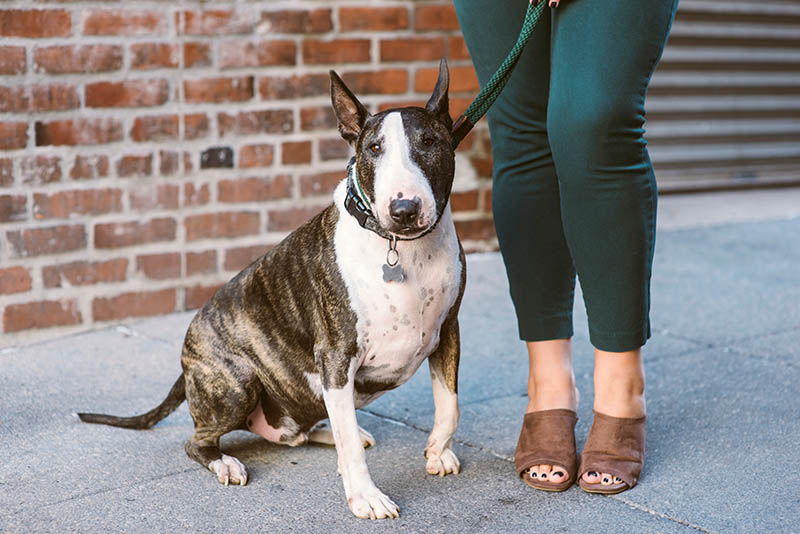
The Hypoallergenic Miniature Bull Terrier
In comparison to their larger counterparts, the Miniature Bull Terrier has more hypoallergenic characteristics than the standard Bull Terrier. While no dog is truly hypoallergenic, the Miniature Bull Terrier may be a better option for Bull Terrier lovers with allergy sensitivities.
The Miniature Bull Terrier has lesser grooming requirements compared to other dog breeds because of their short coat and minimal shedding. Compared to the standard Bull Terrier, Miniature Bull Terriers have a low-shedding coat which reduces the spreading of allergens such as dander and hair.
In general, the Miniature Bull Terrier is considered a more hypoallergenic option because they are a less dander-producing breed compared to the standard Bull Terrier.
What Dog Breeds Are Considered Hypoallergenic?
Although the Bull Terrier is considered a non-hypoallergenic breed, allergy sufferers have other safer choices that allow them to enjoy the company of a furry friend with fewer reactions. For sensitive individuals, it is best to look at dog breeds that are classified as “hypoallergenic” and less likely to trigger allergies!
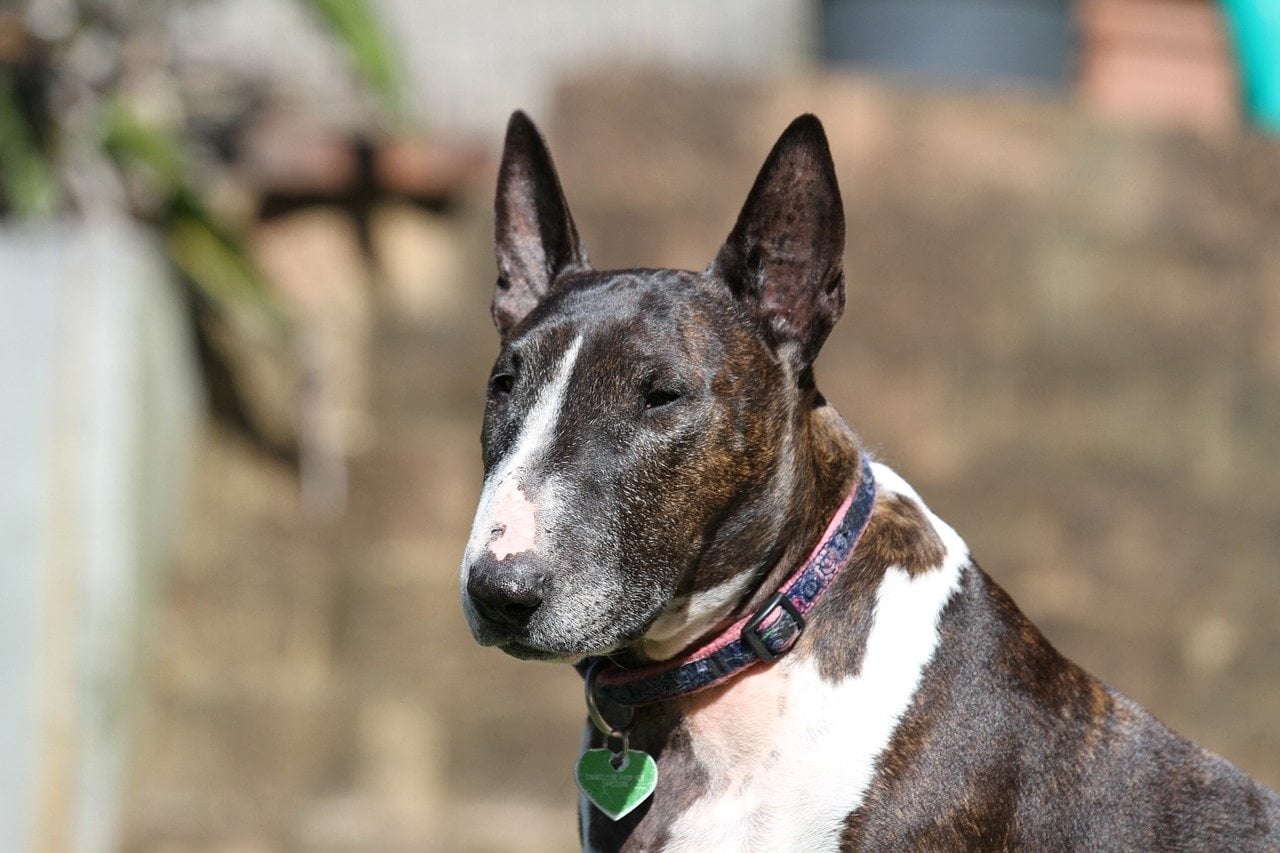
These breeds are considered hypoallergenic because they produce fewer allergens in the form of dander and hair, making them more tolerable for people with allergies. Characteristics that would consider a dog hypoallergenic include minimal shedding, minimal dander, level of drooling, and soft rather than spiky hair. It is interesting to note that the list of low-allergen breeds includes those with the least amount of hair (American Hairless and Chinese Crested) and those with some of the longest coats (Afghan hound)!
However, it is important to note that individual dogs within a breed can vary in their allergy-friendliness, so it’s important for allergy sufferers to spend time with individual dogs before making a commitment.
Talk to your doctor or health specialist about other options to help you reduce your sensitivity to pets. There are a range of anti-histamines and even immunotherapy options available that could help to make your pet-ownership dreams a reality.
Final Thoughts
Despite their short coat, Bull Terriers are not hypoallergenic and can cause significant allergic reactions in sensitive individuals. If you are considering getting a Bull Terrier and suffer from allergies, it’s important to think carefully about whether this breed is the right choice for you.
However, if you already have a Bull Terrier and want to reduce allergy triggers, regular grooming, cleaning, and limiting your dog’s access to certain areas of your home can help.
Owning a dog can be a rewarding and fulfilling experience, but it is important to take allergies into consideration when choosing a breed. By doing your research and taking steps to reduce allergens in your home, you can enjoy the company of your furry friend without suffering!
Featured Image Credit: tratong, Shutterstock

